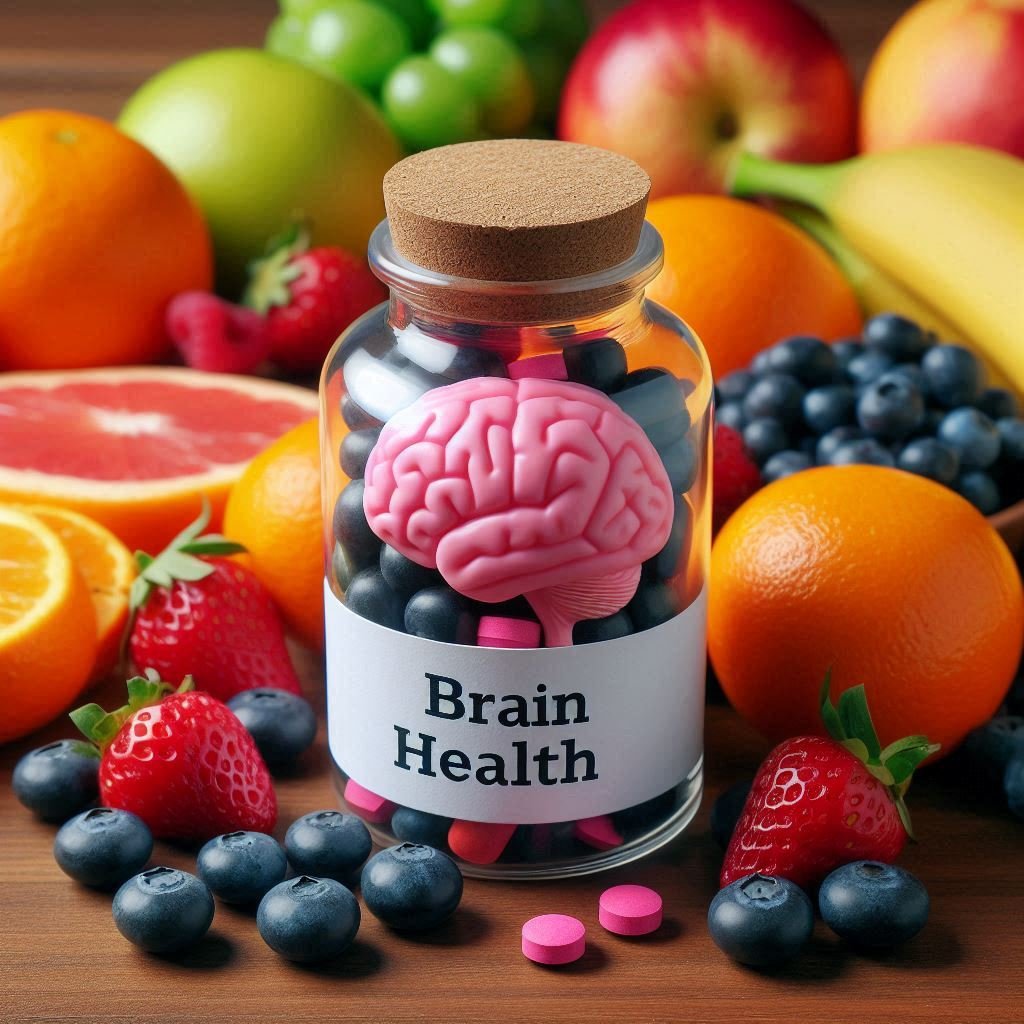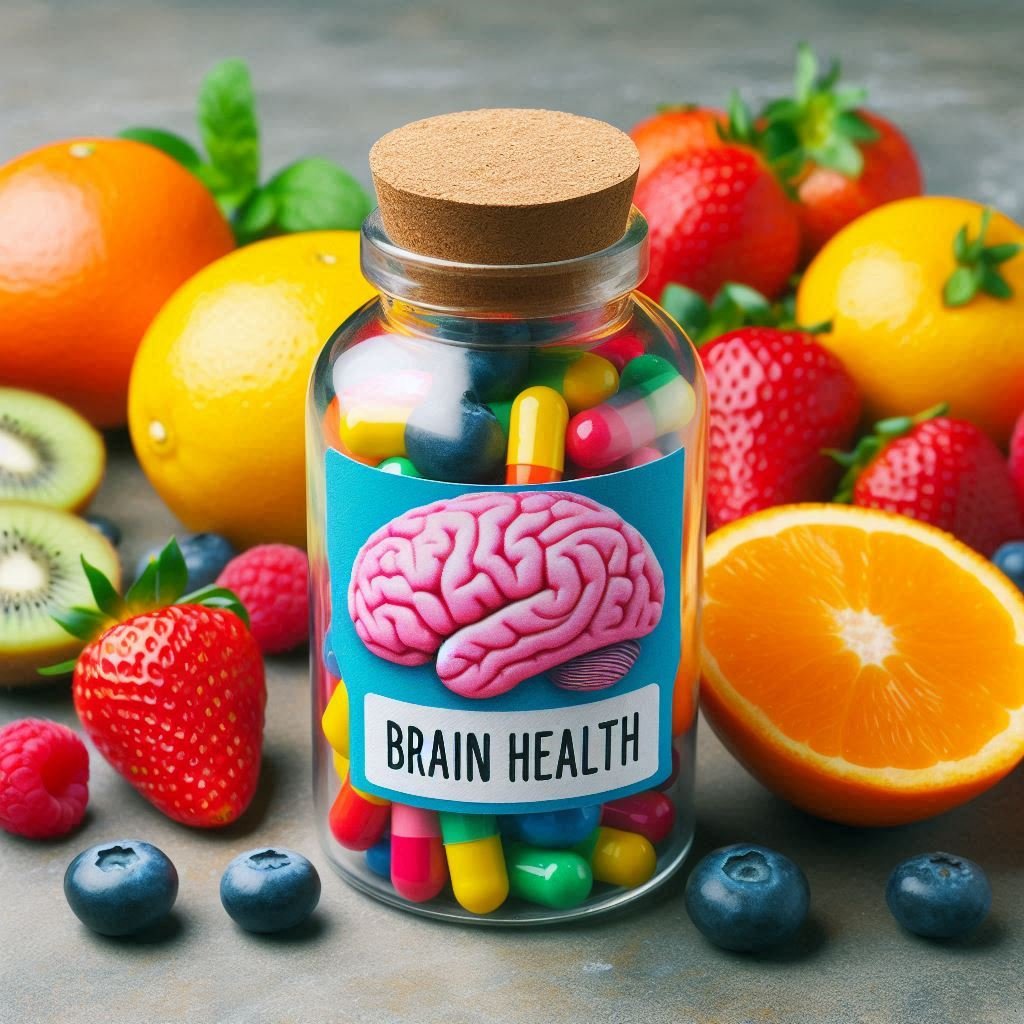Vitamins for Brain Health
In the speedy world of today, it has become significantly pertinent to maintain the capability of the mind at an ideal level. With the present search for strategies for increasing one’s mental skills and preserving brain skills, the job of vitamins for brain health has gained tremendous attention. We will investigate the necessary compounds found to support cerebral health and their applications to preserving and enhancing the brain’s functionality.

The significance of vitamins for brain health
The human cerebrums are complex organs, which means the day-to-day supply of supplements needs parity or balance. Vitamins for brain health play a vital role in this complex process, offering various mental processes or protection from aging symptoms. By getting it and including such basic nourishments in our eating designs, one can start making preventive efforts to preserve and, surprisingly, enhance intelligence.
Key vitamins for brain health
Vitamin B Complex
The B-nutrient kin is imperative for mental health, each of which plays a vital role in mental competency. How about we investigate probably the main B vitamins for brain health?
- Vitamin B1 (Thiamine): This nutrient is crucial for the digestion of glucose in the brain, thus ensuring this is optimally utilized, which is our major source of brain energy.
- Vitamin B6 (Pyridoxine): Linked to the formation of synapses, B6 is responsible for temperament and intelligence level.
- Nutrient B9 (Folate): Folate is an imperative supplement for the mind’s well-being and also engages with mindset control and may help in averting the development of a terrible psyche.
- Vitamin B12 (cobalamin): This nutrient is basic for responding to the well-being of nerve cells and is included in the frame of DNA and red platelets.
Blending a bunch of B-nutrient-rich sustenances or thinking about a B-complex vitamin may be an effective strategy for the safe extension of mental health.
Vitamin D
Often referred to as the “daylight nutrient,” vitamin D is one more imperative contender for the maintainability of mental health. This is because research has established that enough vitamin D reduces the probability of developing neurological diseases and improves brain function. The specific light openness during the primary porterage is an average hotshot; however, sustenance and enhancements can likewise be useful for maintaining ideal measures of this fundamental supplement for the cerebrum.
Vitamin E
Being one of the most well-defined cell support supplements, Vitamin E plays a safe role in thinking about the mind. It helps in the protection of brain cells from oxidative stress and can postpone mental decline, which is associated with aging. With these sustenance sorts in your eating routine, it’s easy to call attention to the fact that including vitamin E, an unfortunate food substance, can be a delicious approach to advancing your psychological health objectives.

L-ascorbic acid
A second cancer prevention agent to be reckoned with, L-ascorbic acid, is essential to brain health due to its neuro-shielding impacts. It maintains and strengthens the formation of synapses between the neurons. Even though it is often associated with invulnerable supercharged capability, the role of L-ascorbic acid in the brain needs to be evaluated.
Vitamin K
Recent literature is revealing that vitamin K may have a more essential role in mental health than previously envisioned. It is involved with the union of sphingolipids, a type of fat, which is necessary for the formation of synapses and their effectiveness. Ensuring enough encouraging vitamin K could be one more piece of the puzzle in maintaining optimal brain health.
Dietary Wellsprings of Vitamins for Brain Health
Making adjustments to your eating habits to accommodate vitamins for brain health does not have to be complicated. Numerous scrumptious and nutritious food varieties are rich in these fundamental supplements:
- Spinach, Kale, and collard greens for B nutrients, Vitamin E, and Vitamin K.
- Fish, especially oily fish (salmon, mackerel, and sardines) for vitamin D and B12
- B nutrients and vitamin D, eggs
- Nuts and seeds for vitamin E; others for vitamin A
- Organic citrus products for L-ascorbic acid
- Whole grain products, both for B nutrients
Thus, when focusing on a fluctuating, adjusted diet, you can most often successfully address your intake of vitamins for brain health.
Enhancements and Cerebrum Wellbeing
Although getting vitamins for brain health through the foods that you consume is good, sometimes supplements can be useful. Nonetheless, it would be best to consult with a medical care expert before starting any booster plan. They can assist in the determination of whether one has any shortcomings and the correct units of vitamins for brain health.
Lifestyle variables and brain health.
While vitamins for brain health are essential, they work best when combined with other solid way-of-life propensities:
- Ordinary activity: Physical work raises blood flow to the brain and thus enhances the delivery of those essential vitamins for brain health.
- Sufficient rest: Great rest propensities enable your cerebrum to properly recharge and process data.
- Mental feeling: Engaging in mentally animated exercises may help have the capacity to maintain one’s mental capacity.
- Stress the executives: Stress, which learners continually experience, can harm their mental health; therefore, finding effective methods of relaxation helps.
Sadly, the quandary of mind-wellbeing exploration is not yet complete and seems destined to continue far into the future.
Since the concept of mind has been progressing, likewise, the comprehension of vitamins for brain health has been changing. Continuing study is looking into new relationships between torment sustenance and mental competency and may be exposing much greater how exactly nutrients have an impact on cerebral health. Holding this information can serve the equivalent of helping us make better decisions for our long-term emotional well-being.
Conclusions about Vitamins for Brain Health
The roles of nutrients in maintaining and enhancing brain health are arguably among the most crucial. From providing for essential mental functions to protecting against cognitive loss as a result of aging, vitamins for brain health are instrumental parts of a healthy lifestyle. It is therefore recommended that one be geared towards a supplement-rich eating habit, always seeking to supplement where necessary, and adopting brain-friendly behaviors to go half way in the right direction of protecting our most prized asset our brains.

FAQs about Vitamins for Brain Health
Are there different nutrition needs to promote mental health at different ages?
However, it should be pointed out that nutrient needs may vary depending on the age of the person. For instance, advanced adults can need more vitamin B12 or D because their absorption abilities are lower. Although youngsters and teenagers may not conventionally suffer from hunger, they should have enough nutrients to support their mental health. If there is anything that can be as effective as the recommended dietary rules of the pyramids, it has to be counseled to age-explicit dietary rules or a medical care supplier for tailored recommendations.
Is it possible for pressure to exhaust nutrients essential for the brain’s health?
However, constant pressure persistently depletes certain nutrients, most of which play a crucial role in mental health. High-protein and low-fat diets or supplements Rich Pacific diets are particularly important during phases that upset the body, or it is advisable to take supplements under a doctor’s prescription.

